Egypt officially responded to the announcement by the Ethiopian Prime Minister, Abiy Ahmed, regarding the completion of the construction of the Renaissance Dam and his country's readiness to officially open it in September next, describing the step as "illegitimate" and a clear violation of international laws and agreements.
Engineer Hani Sewilam, the Egyptian Minister of Irrigation, affirmed in a meeting with Egyptian ambassadors abroad yesterday, Thursday, that Cairo strongly rejects Ethiopia's policy of imposing facts unilaterally through measures related to the Nile River, pointing out Ethiopia's continued promotion of the completion of the dam despite not reaching a binding agreement with the downstream countries, Egypt and Sudan, with fundamental reservations from both sides.
Sewilam emphasized Egypt's genuine political commitment to reaching a binding legal agreement on the operation of the Renaissance Dam that serves the interests of all parties and ensures no harm to the interests of the downstream countries, but he noted the lack of political will on the Ethiopian side, which seeks to impose water hegemony instead of cooperation and partnership, a situation that Cairo will not allow.
The Egyptian Minister described Ethiopia's repeated calls to resume negotiations as "evasive maneuvers" aimed only at improving Ethiopia's international image, confirming that the course of negotiations spanning more than 13 years proves that Ethiopia does not want a fair agreement.
On the other hand, Ethiopian Prime Minister Abiy Ahmed affirmed before parliament that the construction of the Renaissance Dam has been completed without affecting the water reserves in the High Dam in Egypt, and that the dam has not caused any harm to Egypt or Sudan.
It is worth mentioning that the file of the Renaissance Dam remains a sharp point of contention between Egypt and Sudan on one hand, and Ethiopia on the other, despite ongoing Egyptian diplomatic moves at technical and political levels to clarify the position and support Egypt's water rights, considering the dam issue as existential linked to the lives of its people.
The fourth and final meeting of the Renaissance Dam negotiations between the three countries ended disastrously at the end of last year, as Ethiopia rejected adopting any technical or legal solutions while persisting in imposing its unilateral positions.

